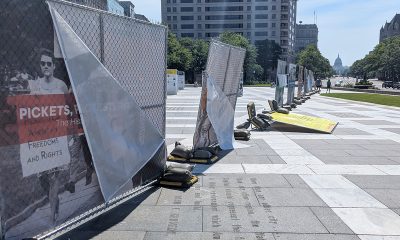Local
Top 10 local news stories for 2023
Hate crimes continue, new queer bars open, and much more
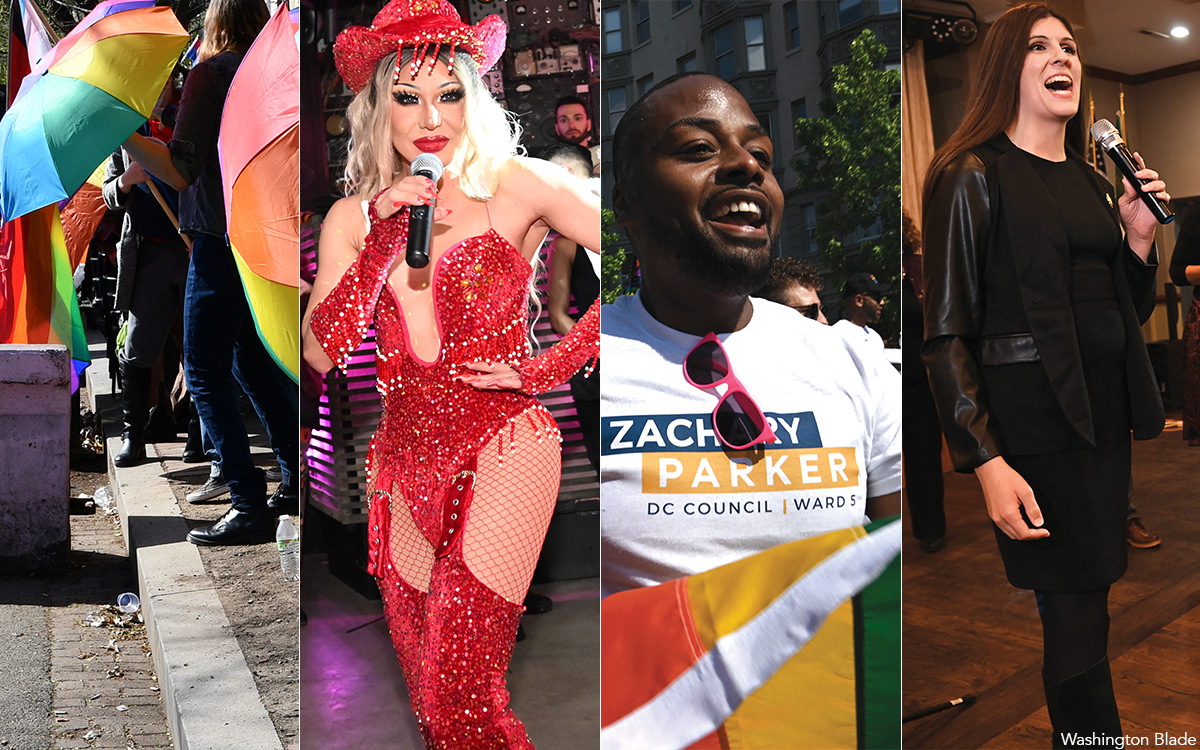
It was another busy year in queer news. Here are the Blade staff picks for the top 10 local news stories of 2023.
#10: Florida prosecutor drops sex with minor charges against Brett Parson
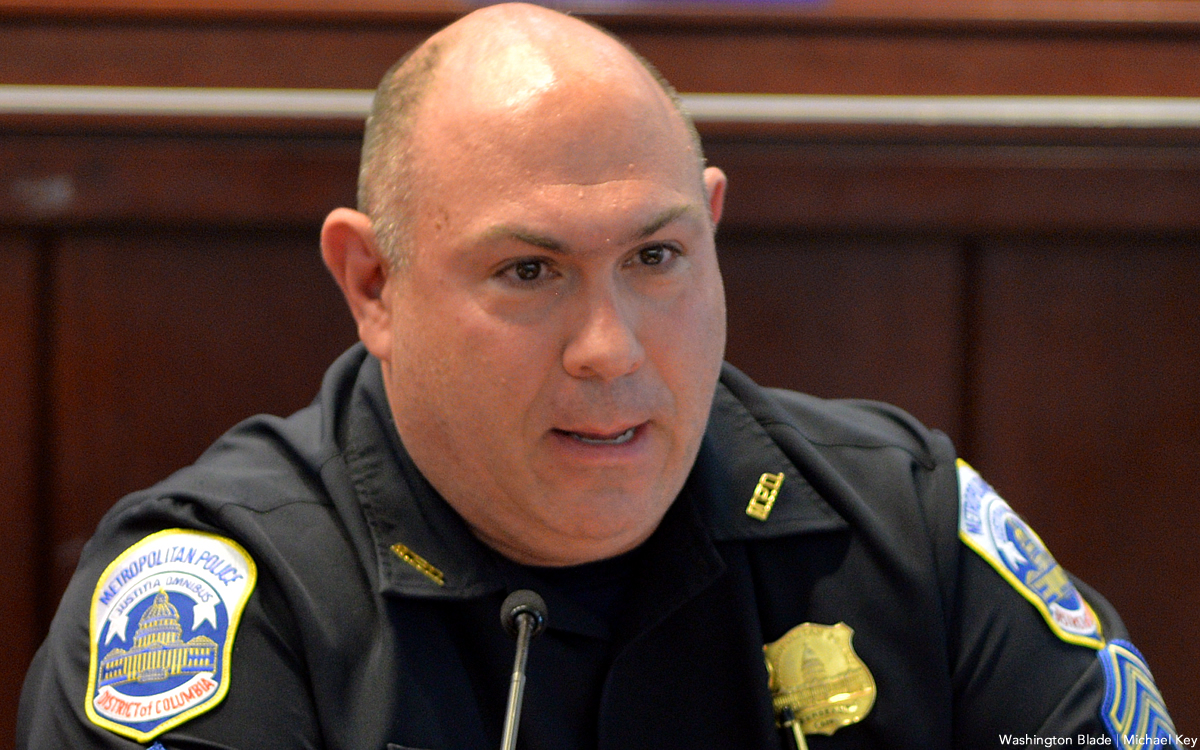
A prosecutor with the Broward County, Fla., State Attorney’s Office on March 13 dropped two charges of unlawful sexual activity with a minor filed against gay former D.C. police lieutenant Brett Parson by Boca Raton, Fla. police in February 2022. Parson’s arrest came shortly after he retired from the police force after 26 years of service, including his role as supervisor of the D.C. police LGBT Liaison Unit.
A memorandum released by the State Attorney’s Office disclosed that prosecutors decided to drop the charges after it became clear that the then 16-year-old boy, who told authorities that his sexual encounter with Parson was consensual, did not want to participate in the prosecution against Parson.
Court records show the youth met Parson after he posted a message on the gay hookup site Growlr and claimed he was 19 years old. The age of sexual consent in Florida is 18, although in several other states, including D.C., the age of consent is 16 and the sexual encounter between Parson and the youth would have been legal in those other states and D.C.
#9: Four new D.C. LGBTQ bars open in 2023
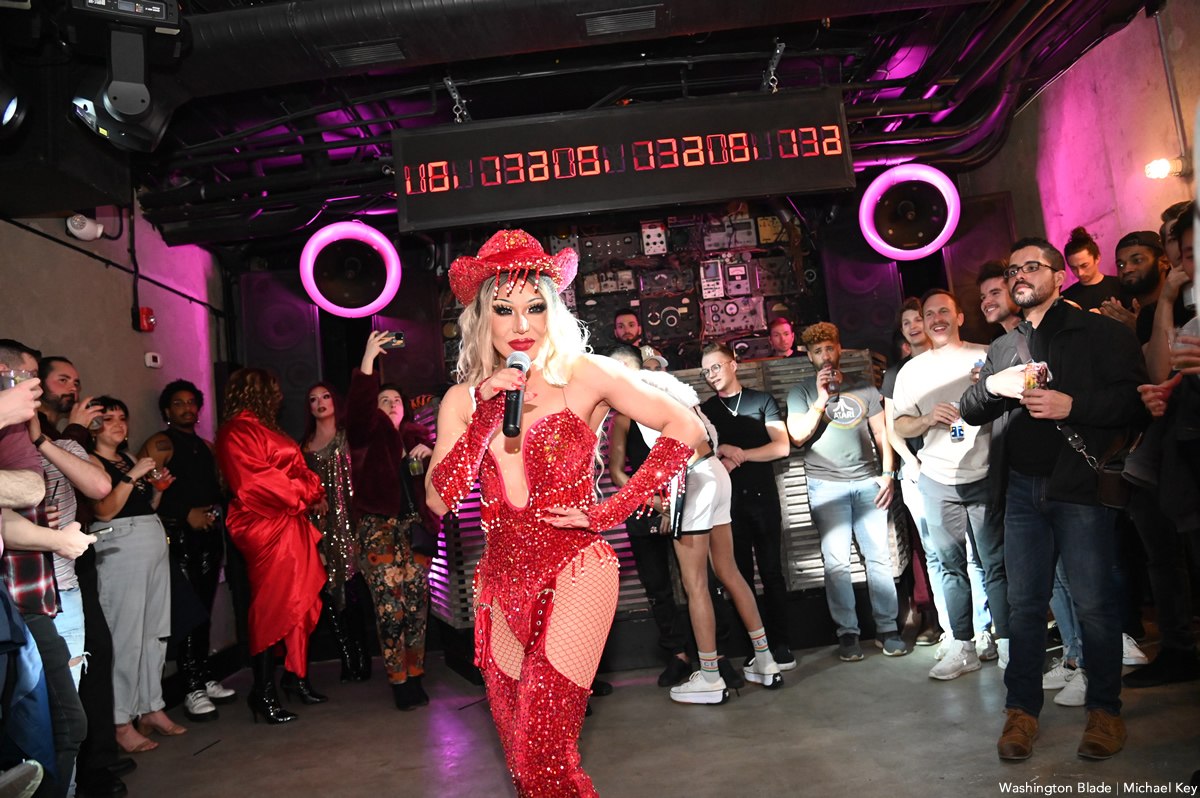
Four new LGBTQ bars opened in D.C. in 2023, bringing the total number of LGBTQ identified bars in the nation’s capital to 19. The first of the four new ones to open was Little Gay Pub at 1100 P St., N.W. near Logan Circle. Its owners and business partners, Dito Sevilla, Dusty Martinez, and Benjamin Gander, have years of experience working at other nearby bars and restaurants, with Martinez and Gander having worked at other gay bars.
The gay nightclub and dance bar Bunker opened a short time later in a large basement space at 2001 14th St., N.W., steps away from the bustling nightlife intersection at 14th and U streets, N.W. Co-owners Zach Renovates and Jesus Quispe for many years produced LGBTQ entertainment events through their company KINETIC Presents. Next to open was Shakers at 2014 9th St., N.W. in the busy 9th and U Street entertainment corridor, which bills itself as a “full spectrum bar, with everything from family nights to ANC meet-and-greets to drag shows.”
And in December Thurst Lounge opened at 2204 14th St., N.W. Owners Brandon Burke and Shaun Mykals describe it as a “space that represents and honors the unique and culturally rich Black gay experience.”
#8: D.C. gov’t holds ‘LGBTQIA Emergency Training’ event
About 25 representatives of local LGBTQ organizations turned out on April 5 for the first in what was expected to be a series of LGBTQIA+ Emergency Preparedness Training sessions offered by the D.C. Homeland Security and Emergency Management Agency and the Mayor’s Office of LGBTQ Affairs.
Japer Bowles, director of the Office of LGBTQ Affairs, said the initial training session was for nonprofit LGBTQ organizations aimed at helping them take steps to minimize potential threats of violence and to recognize behaviors by individuals who may pose a threat. He said among those attending the April 5 training session were representatives of the D.C. Center for the LGBTQ Community, one of the city’s largest local LGBTQ organizations that is about to move into a new, larger space in a building in the city’s Shaw neighborhood.
#7: Proud Boys target local drag queen story hour events
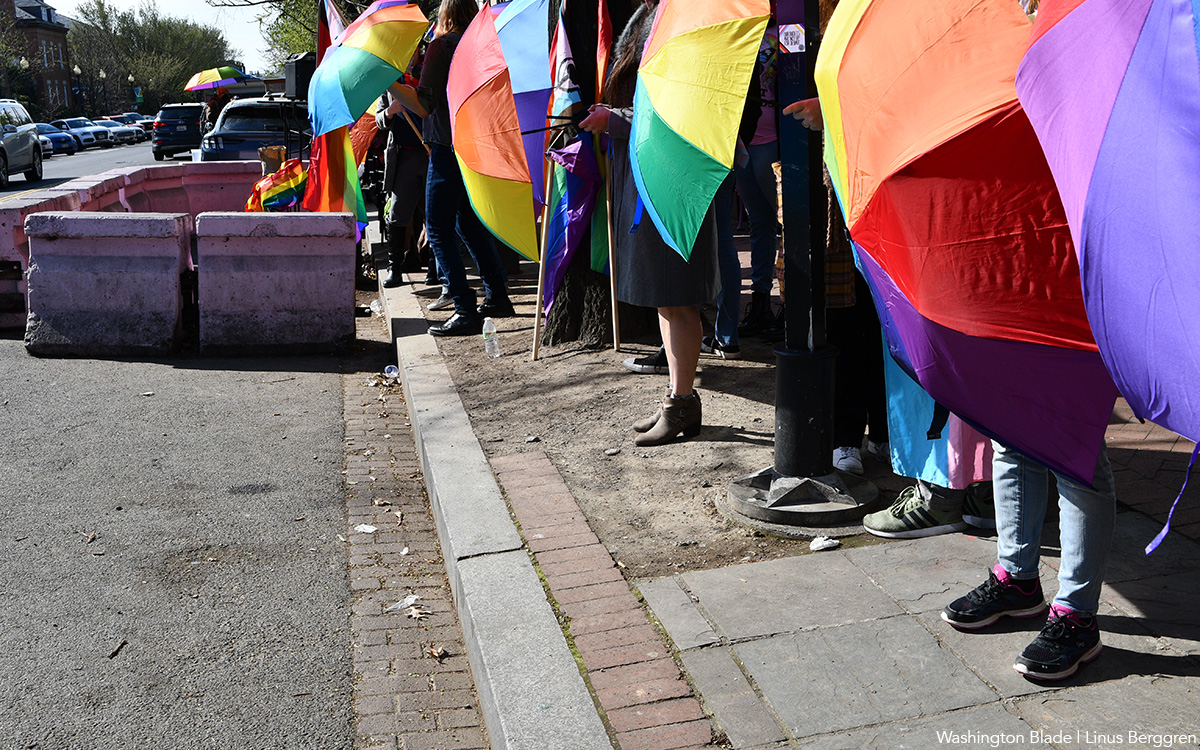
The far-right group Proud Boys targeted bookstores in Silver Spring, Md. and D.C. in February for protests against the reading of children’s stories by drag performers in an event known as Drag Queen Story Hour. But the group only showed up at the Loyalty Bookstore in Silver Spring. Silver Spring police dispersed the Proud Boys members and counter protesters who supported the drag event after the two groups shouted at each other and reports surfaced that a Proud Boy member assaulted one of the supporters.
One week later, after news surfaced that the Proud Boys planned to hold a protest targeting a Drag Story Hour event at the gay-owned Crazy Aunt Hellen’s restaurant in the Barracks Row section of Capitol Hill in D.C., dozens of supporters turned out in anticipation of the Proud Boys protest. D.C. police, who closed the one-block section of 8th Street, S.E. in anticipation of the protest, said the Proud Boys never showed up.
#6: D.C. mourns loss of two community leaders and a beloved bartender
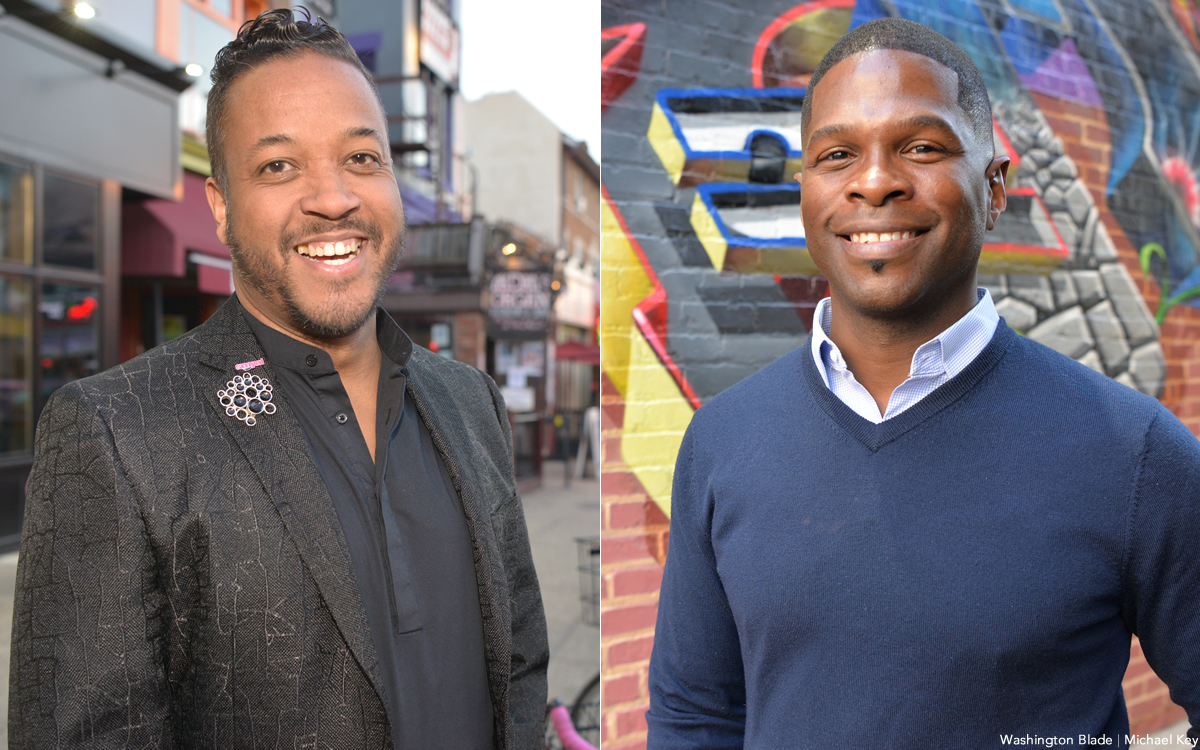
Many in D.C.’s LGBTQ community in July mourned the unexpected deaths of two gay longtime supporters of LGBTQ causes, Jocko Fajardo and Tarik Pierce, and a beloved bartender, Brooks Davis. Fajardo, a skilled chief, florist, and event planner, and Pierce, an official with the U.S. Department of Veterans Affairs, each died in their homes at the age of 45 in D.C. within one week of each other of undisclosed causes. About 300 people turned out in D.C. ‘s Logan Circle for a candlelight vigil in remembrance of the two men.
Also mourned by a large circle of friends in July was gay bartender Brooks Davis, 29, who died on July 17. Family members asked that the cause of death remain private. Davis worked at the D.C. gay nightclub Bunker after having worked for the luxury retail outlet Louis Vuitton and later operated his own exotic plant business before beginning work as a bartender.
#5: Partner says police botched probe into death of Washington Wizards chef
The longtime domestic partner of Ernest Terrell Newkirk, 55, who worked as chef at D.C.’s Capital One Arena for the Washington Wizards basketball team, expressed strong concern that D.C. police failed to adequately investigate Newkirk’s initially unexplained death.
The partner, Roger Turpin, pointed out that Newkirk was found deceased on a residential street in the 1100 block of 46th Place, S.E., shortly after 3 a.m. on May 28, with his wallet, watch, jewelry, and his car all missing. There were no signs of injury on Newkirk’s body, and it took the D.C. medical examiner four months to complete toxicology tests to finally determine the cause of death, which was acute alcohol intoxication.
D.C. police have said they investigated the case. But Turpin says investigators appear to have declined to follow up on information Turpin provided them to track down someone who may have stolen Newkirk’s car, phone, and credit cards. Turpin says he gave police phone numbers that someone used on Newkirk’s stolen phone to make calls that Turpin obtained from the phone records.
#4: Two area trans lawmakers make history
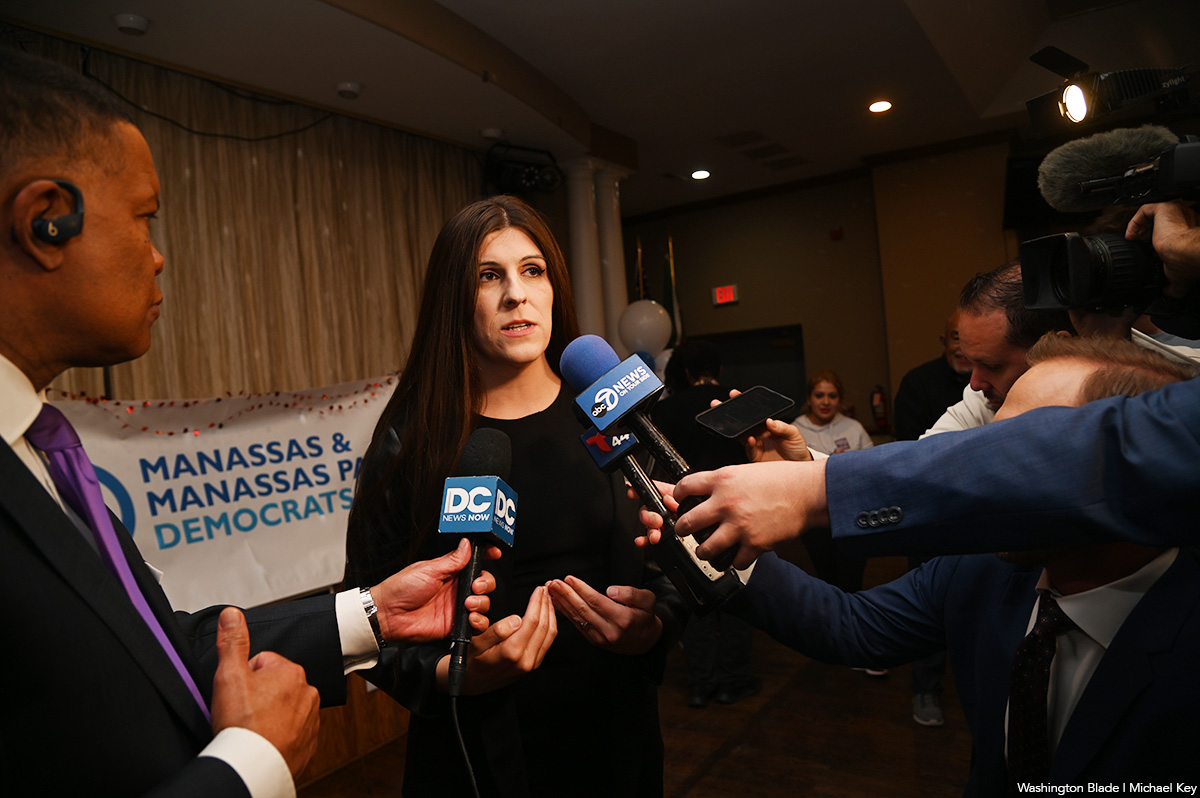
Two transgender elected officials in the greater D.C. region made history in 2023. Virginia state Del. Danica Roem (D-Manassas) won a decisive victory for a seat in the Virginia state Senate in the state’s Nov. 7 election, becoming the second openly transgender person to win election to a state Senate in the country.
And earlier in the year, Delaware state Sen. Sarah McBride, who became the first transgender person to win a seat in a state Senate in 2020, declared her candidacy for the single Delaware seat in the U.S. House of Representatives. Recent polling data show McBride is far ahead of her closest rival in the 2024 Democratic primary. If she wins the primary, as expected, and wins in the November 2024 general election in the solidly Democratic state of Delaware, McBride would become the first transgender person in the U.S. Congress.
#3: Spate of assaults targets LGBT people for possible hate crimes
Two gay bar customers were stabbed in the neck with nonfatal wounds on Aug. 18 outside the Dupont Circle gay bar Fireplace by a woman who D.C. police arrested on a charge of assault with a dangerous weapon and a judge ordered to undergo a mental health examination. That incident followed the arrest by D.C. police in January of three juveniles for four separate armed robberies in the Dupont Circle area near gay bars.
And in August, the Office of the U.S. Attorney for D.C. continued to decline to prosecute two male suspects identified by D.C. police who robbed and pistol whipped a D.C. gay couple in January 2022 after the couple appealed to prosecutors to move ahead with a prosecution. A spokesperson for the U.S. The Attorney’s office said there was insufficient evidence to charge the suspects. Dupont Circle Advisory Neighborhood Commissioner Vincent Slatt, who heads the ANC’s Rainbow Caucus, expressed concern that police were not disclosing sufficient information on whether the growing number of crimes in Dupont Circle and other city neighborhoods are LGBTQ related and whether the assaults against them may be hate crimes.
With this as a backdrop, D.C.’s new police chief, Pamela Smith, told the Blade in an interview she pledges “fair and equal treatment” for the LGBTQ community.
#2: Violence continues against D.C.-area trans women
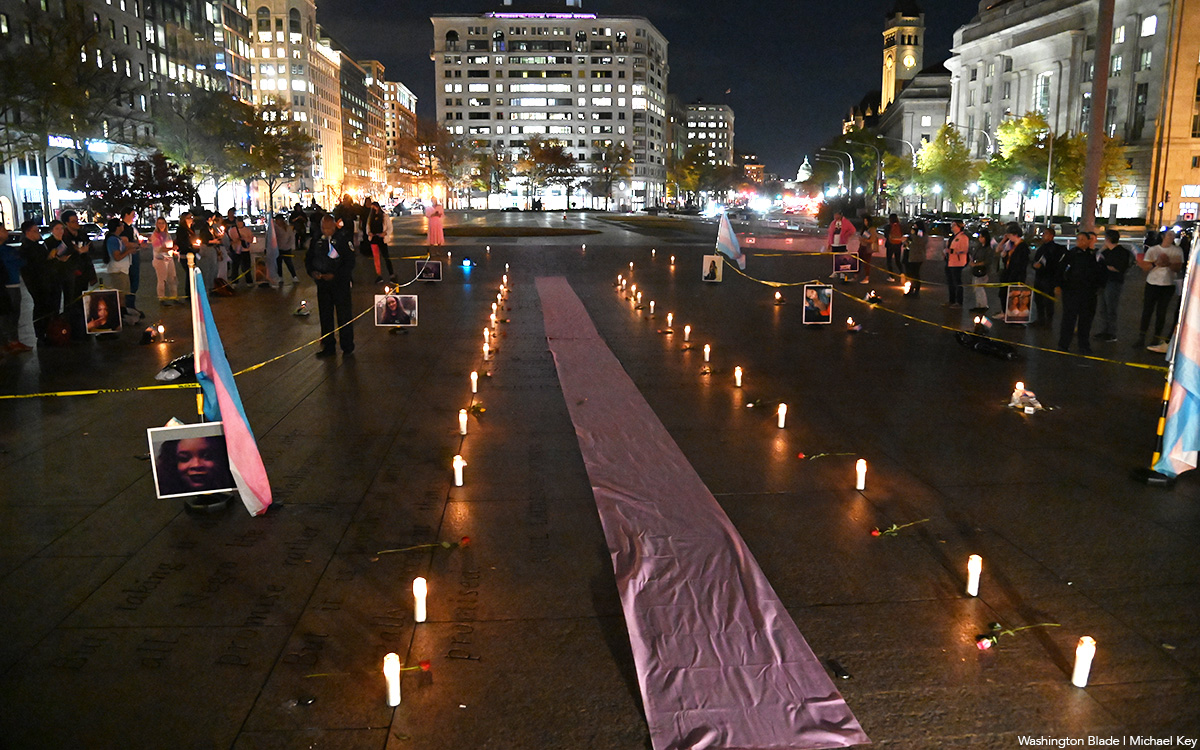
At least three transgender women were murdered in the D.C. region and a fourth was found dead under suspicious circumstances in 2023, prompting transgender activists to continue their ongoing efforts to address what they consider a nationwide epidemic of anti-trans violence.
The first of the incidents took place Jan. 7 when Jasmine “Star” Mack, 36, was found stabbed to death on the 2000 block of Gallaudet St., N.E. D.C. police say they are actively investigating the case. On March 24, Tasiyah Woodland, 18, was shot to death outside the Paradise bar and grill in Lexington Park, Md. With the help of D.C. police, St. Mary’s County police charged D.C. resident Darryl Parks Jr., 29, with first-degree murder and additional gun related charges in connection with the murder. Police said the shooting followed a dispute between Parks and Mack, but Mack’s family members believe it was a hate crime.
On Oct. 2, 30-year-old trans woman Skylar Harrison Reeves’s partially naked body was found on a park bench in D.C.’s Marvin Gaye Park. Police say there were no obvious injuries found and they are waiting for the medical examiner’s office to determine the cause of death upon completion of toxicology tests. Reeves’s aunt says she believes foul play led to the death. And on Oct. 18, D.C. resident A’nee Roberson, 30, was fatally struck by a car on the 900 block of U Street, N.W., after witnesses say she was assaulted by one or more unidentified suspects and chased into the street in the path of an oncoming car. D.C. police have listed the incident as a homicide, saying the person or persons who assaulted her and forced her into the street committed second-degree murder.
#1: Gay College Park Mayor Patrick Wojahn pleads guilty to child porn charges
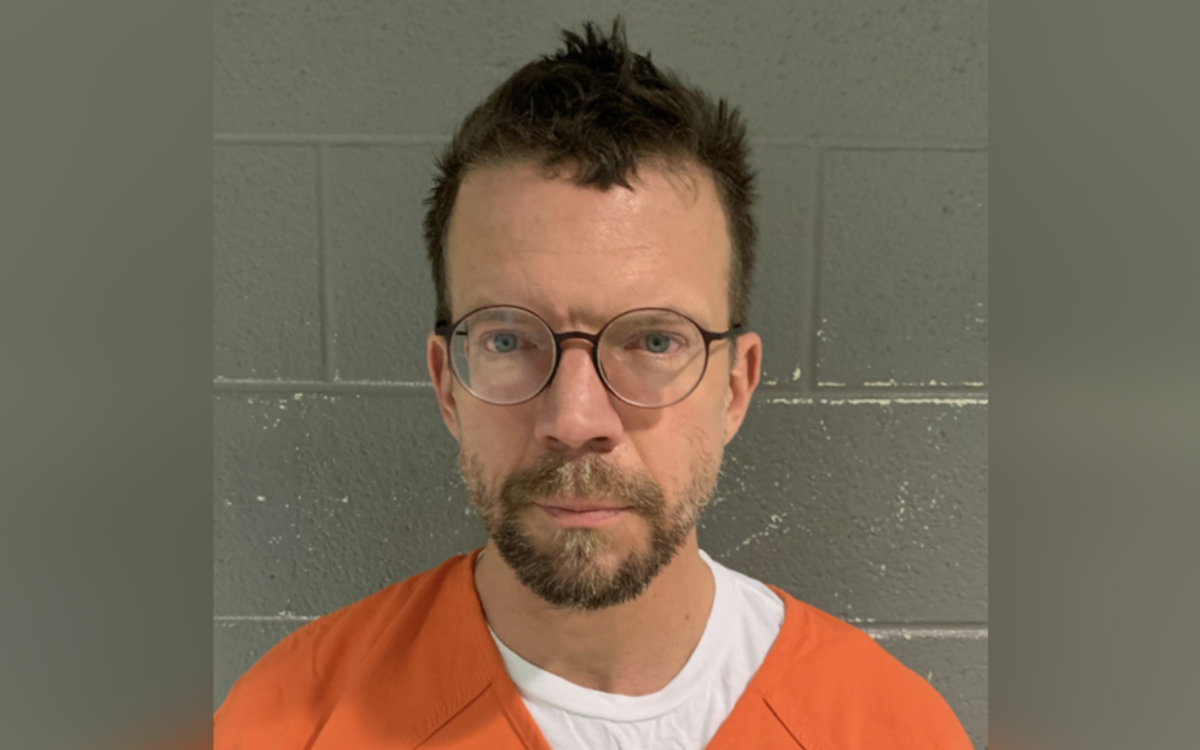
A Prince George’s County Circuit Court judge on Nov. 20 sentenced gay former College Park Mayor Patrick Wojahn to 30 years in jail just over three months after Wojahn pleaded guilty to 140 counts of possession or distribution of child pornography.
The sentencing followed news that surfaced in March, which shocked Wojahn’s friends and longtime political supporters, including LGBTQ activists, that he had been arrested after police raided his College Park house and confiscated multiple devices, including computers and cell phones, containing hundreds of images or videos of child pornography depicting pre-pubescent boys.
At the sentencing hearing over a dozen of Wojahn’s friends and family members, including his husband, urged the judge to consider Wojahn’s own statements saying mental health issues were at play in his actions and that he cooperated with the police investigation and deeply apologized for what he did. Under Maryland sentencing rules, Wojahn will be eligible to apply for release on parole after serving 12 and a half years of incarceration.
Honorable mention: Zachary Parker sworn in as new D.C. Council member
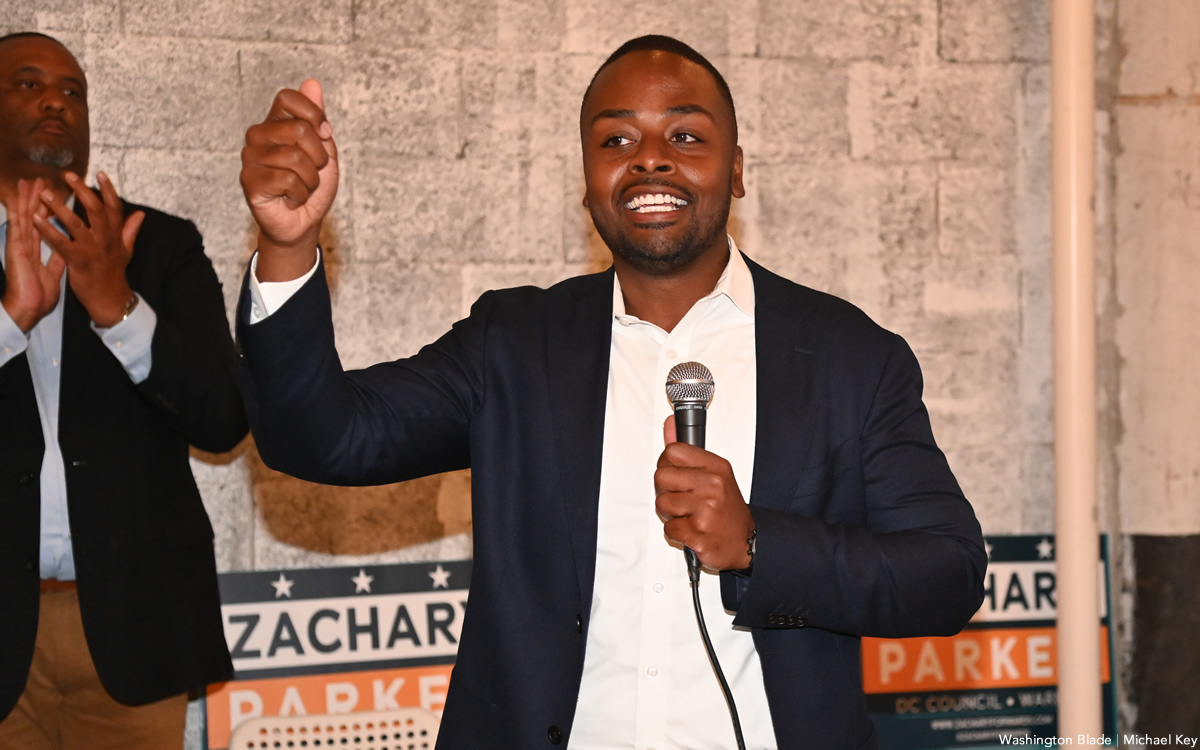
Former D.C. school board member Zachary Parker was sworn in on Jan. 2 as the first openly gay member of the D.C. Council since 2015 at an inaugural ceremony in which other elected officials, including D.C. Mayor Muriel Bowser and six other Council members were also sworn in.
Parker, a Democrat, won election in November 2022 to the Ward 5 Council seat by a wide margin after winning a hotly contested Democratic primary for the Ward 5 seat.
In his inaugural speech after being sworn in as a Council member, Parker said he ran on a vision that “all District residents deserve good and accountable government” and pledged to work to help serve the needs of the city’s diverse residents, including LGBTQ residents.
“With this honor comes the responsibility to address the ridiculously high rates of queer youth homelessness” and “ensure that we’re investing in the people and organizations that are fighting every day for our LGBTQIA plus neighbors,” he said in his speech.
Virginia
Va. court allows conversion therapy despite law banning it
Judge in June 30 ruling cited religious freedom.

In 2020, the state of Virginia had banned the practice of conversion therapy, but on Monday, a county judge ruled the ban violates the Virginia Constitution and Religious Freedom Restoration Act, allowing the therapy to start once more.
The conversion therapy ban, which can be seen in Va. Code § 54.1-2409.5 and 18VAC115-20-130.14, was overturned on June 30 as a result of two Christian counselors who argued that their — and all Virginia parents’ — constitutional right to freedom of religion had been encroached upon when the state legislature passed the ban.
A Henrico County Circuit Court judge sided with John and Janet Raymond, two Christian counselors represented by the Founding Freedoms Law Center, a conservative organization founded in 2020 following Virginia’s conversion therapy ban. Virginia’s Office of the Attorney General entered a consent decree with FFLC, saying state officials will not discipline counselors who engage in talk conversion therapy.
Conversion therapy, as the legislation described it, is considered to be “any practice or treatment that seeks to change an individual’s sexual orientation or gender identity, including efforts to change behaviors or gender expressions or to eliminate or reduce sexual or romantic attractions or feelings toward individuals of the same gender.” The ban’s reversal will now allow parents to subject their children to these practices to make them align better with their religion.
This decision comes despite advice and concern from many medical and pediatric organizations — including the American Psychiatric Association, American Psychological Association, American Association for Marriage and Family Therapy, and the American Counseling Association, to name a few — all of which denounce conversion therapy as dangerous and harmful to those subjected to it.
The American Medical Association, the largest and only national association that convenes more than 190 state and specialty medical societies, says that “these techniques are the assumption that any non-heterosexual, non-cisgender identities are mental disorders, and that sexual orientation and gender identity can and should be changed. This assumption is not based on medical and scientific evidence,” with attached data indicating people subjected to conversion therapy are more likely to develop “significant long-term harm” as a result of the therapy.
The AMA goes as far as to say that they outright “oppose the use of reparative or conversion therapy for sexual orientation or gender identity.”
FFLC has a clear goal of promoting — if not requiring — conservative ideology under the guise of religious freedom in the Virginia General Assembly. On their website, the FFLC argues that some progressive policies passed by the Assembly, like that of freedom from conversion therapy, are a violation of some Virginians’ “God-given foundational freedoms.”
The FFLC has argued that when conservative notions are not abided by in state law — especially when it involves “God’s design for male and female, the nuclear family, and parental rights” — that the law violates Virginians’ religious freedom.
A statement on the FFLC’s website calls gender dysphoria among children a “contagion” and upholds “faith-based insights” from counselors as equal — in the eyes of the law — to those who use medical-based insights. This, once again, is despite overwhelming medical evidence that indicates conversion therapy is harmful.
One study showed that 77 percent of those who received “sexual orientation change efforts,” or conversion therapy, experienced “significant harm.” This harm includes depression, anxiety, lowered self-esteem, and internalized homophobia. In addition, the study found that young LGBTQ adults with high levels of parental or caregiver rejection are “8.4 times more likely to report having attempted suicide,” with another study finding that “nearly 30 percent of individuals who underwent SOCE reported suicidal attempts.”
Virginia Senate Majority Leader Scott Surovell, a Democrat representing Fairfax, said that the overturning of the ban on religious merit disregards the entire concept of having professionally licensed counselors.
“I have no problem if somebody wants to go look at religious counseling from their priest or their minister, their rabbi, their imam — that’s perfectly fine,” Surovell told the Virginia Mercury. “When somebody goes to get therapy from somebody licensed by the commonwealth of Virginia, there’s a different set of rules applied. You can’t just say whatever you want because you have a license. That’s why we have professional standards, that’s why we have statutes.”
District of Columbia
GenOUT Chorus offers solace, strength to LGBTQ teens
Summer camp held from June 23-27

As Pride month draws to a close and Washington begins to take down its rainbow flags and WorldPride decorations, it can be easy to confine the ideas of LGBTQ liberation to June. One historic organization in Washington has been speaking out — or singing out if you will — to ensure that LGBTQ youth are allowed to explore and be themselves every month of the year.
The Gay Men’s Chorus of Washington is one of the oldest and largest LGBTQ choruses in the world. With more than 300 members and more than 40 years in the D.C. LGBTQ community, to say it is an institution would be an understatement.
Beginning in 1981, following an inspiring performance by the San Francisco Gay Men’s Chorus at the Kennedy Center, a group of 18 gay men — led by a “straight” woman and friend of Washington’s gay community, Marsha Pearson — created the GMCW. Since its establishment the organization has only grown in number and relevance within the city. From hosting multiple concerts a year, international equality trips, and creating a dedicated space to “inspire equality and inclusion with musical performances and education,” the GMCW is one of the cornerstone organizations in the Washington LGBTQ community.
One of the most remarkable parts of the GMCW is its youth outreach program and choir: GenOUT. The outreach ensemble specializes in providing a space for Washington’s LGBTQ and allied youth, ages 13-18, to find their voice through song and connect that voice to community. The GenOUT program has been around since 2001, and since 2015 has provided a platform for their voices to be heard — literally — making it the first LGBTQ youth chorus in the Washington area.
The Washington Blade sat down with GenOUT Director C. Paul Heins and member Ailsa Ostovitz to discuss why GenOUT, and more specifically the GenOUT summer camp, which was held from June 23-27, has become an essential space for LGBTQ youth in the D.C. area to find their voice amid less-than-supportive administration and rising anti-LGBTQ rhetoric in the nation.
“This is my 11th season with GenOUT, and also the 11th season with Gay Men’s Chorus of Washington,” Heins said when explaining how he ended up in the director role for the self-selected, no audition required youth outreach ensemble. “I was hired in August of 2014 to start GenOUT. I spent that first fall researching other choruses, figuring out the infrastructure, promoting the chorus, and building relationships with schools, organizations, and faith communities. And then we started in January of 2015 with nine brave singers and since then, we’ve had 150+ singers from 80 or more schools in the DMV participate.”
Ailsa Ostovitz, on the other hand, being in high school had not had as much experience with choirs — yet her commitment and unwavering passion for the work she — and the other performers within GenOUT provide to each other was unmistakable.
“I’ve been a part of the course since April of 2022, and that was like seventh grade— which is wild to think about,” Ostovitz said when reflecting on how long she had been a part of GenOUT. She explained how she had begun to develop a drive for filling leadership roles within GenOUT after gaining valuable experiences and education from the organization.
“This is my first year in leadership,” she added. “The rest of the years, I kind of hung back. I really wanted to — especially last season — kind of put myself in the position of a peer and think ‘What would I want from people that are supposed to represent me to the adults? What would I want out of that?’”
And with those questions in mind, Ostovitz explained she buckled down and worked hard to get to where she is now as a member of the leadership team within the GenOUT choir.
“I spent a lot of time working with my section leader, and, looking up at him and being like, ‘What are you doing now that I can do in the future?’ And so this year, I ran for leadership,” Ostovitz said. “I got section leader, and that was cool. I’ve just spent a lot of time — most of my time in this course — learning leadership skills to kind of help me in all sorts of things in life, because I like to take control of things, and I like doing stuff.”
These leadership skills are just a handful of the things that students like Ostovitz learn while participating in the program. This year’s theme was “Make Them Hear Us!: Empowering LGBTQ+ and Allied Youth Through Music, Media, and Community,” and provided multiple opportunities for GenOUT’s members to engage with new concepts, ideas, and experiences.
From field trips to mentoring opportunities to an end-of-camp performance, it becomes clear when speaking to those familiar with the GenOUT experience: it is not your traditional summer day camp.
“The title of the camp references the anthem that GMCW has sung for many years,” Heins said. “‘Make Them Hear You’ from the musical ‘Ragtime’ encourages us to share important stories — stories that honor the fights that we’ve been fighting, the rights that we have won, affirmations that we seek for every human being, and the focus on media — specifically developing young people’s understandings of the kinds of media that they can access and use to share their voice.”
The camp offers singing and dancing lessons, creative writing exercises, LGBTQ+ history lessons, and open discussions about identity — providing an outlet for students to figure out who they want to be and find their voice.
“What this camp does, I believe, is it helps foster young people’s voices and not only encourages them to speak, but to give them the skills to speak in a way that will be heard meaningfully,” Heins added. “I have noted that youth in queer choruses like GenOUT have said that singing in a chorus allows young people to express themselves more honestly and with greater passion than other forms of expression. They’ve also said that singing with others that understand you on a very deep, profound level, makes the expression much easier and more beautiful. I think that experience is what really makes this a special opportunity for young, LGBTQ and allied people.”
Ostovitz echoed Heins’s sentiment, emphasizing that the space GenOUT provides allows her to feel empowered in ways more than by creating leadership skills that will help her later in life. GenOUT has allowed for her to see the humanity and similarities LGBTQ youth all face in a straight world.
“Joining the chorus and being in this camp, it really gives people a chance to see that every person is going through the same experience you are, on a level of finding your own identity and being confident in that,” Ostovitz said. “It really, really serves a purpose by showing there are still queer people. They’re not fizzling out — young people are queer. We want to use our voices to express what we feel and how things are affecting us, and I think that using music to do that is probably one of the most powerful ways to do that.”
In addition to allowing for internal growth and honing their singing abilities, both Ostovitz and Heins pointed out the other valuable skills students learn while in the GenOUT program. Ostovitz explicitly highlighted the mentorship program GenOUT has with GMCW, and how it has helped students like her figure out their future.
“Because we are so connected with GMCW, we run a mentorship program where, if you want to explore career, identity, whatever, we can connect you with somebody from GMCW,” Ostovitz said. “You get to spend a whole semester with a person working on your voice or your career or your what you want to do in higher education. It’s not only for things related to your queer identity, but it’s also just for life. It’s really cool.”

This year’s theme, centering around media and the many ways people can share their voice, was highlighted through the camp’s field trips to two legacy media organizations — WAMU and NBC Washington — and a discussion with staff from the Washington Blade, including Publisher Lynne Brown and International News Editor Michael K. Lavers.
“GenOUT provides a chance to get to know people from all around this area, but it also connects you to older folks, It connects you to people from the past, as well as we learn about LGBTQ history,” Heins said. “I think a camp specific thing is we want young people to understand how they can share their stories beyond just talking to their friends. There are these forms of media that are out there to share your stories, to have your voices heard, and to have a sense that these media are there for everyone. It’s not just a thing for people aged 21 and over. That was something that Lynne and Michael from the Blade were sharing with; that anyone can write in a letter to the editor. It doesn’t mean it’s going to be published, but that anyone has that opportunity. And I think that’s a great way for them to say the Blade is open to you to share your voice.”
The concept that there are people who want to, or may need to hear queer voices represented is one that is not lost on Ostovitz.
“There is something Thea says that has kind of integrated into our chorus — that someone out there needed to hear you, needed to hear your voice, needed to hear your story,” Ostovitz said. “That’s something that I kind of live by in this chorus, where I’m like, ‘I believe that there is someone out there that needed to hear this song for whatever reason, whatever it did for them. And I’m hoping to learn how much more can this chorus do for not just our little community, but how much more can it do around the world or the country — especially now.”
Living in the political center of the U.S., Ostovitz explained, has impacted how she approaches her identity, her education, and the urgency of using her voice — both as a student and as a young queer person navigating an increasingly hostile national climate.
“Being so close to the political center of the country and also a student at the same time has not been the easiest thing in the world as of late,” she said. “You’re thinking a lot about ‘Oh, I wonder if this program in my school will still exist next year,’ because a lot of the funding for physics and science programs in general has been cut. So I’m fortunate enough that Maryland has been pretty good about going against this administration. And so being in this chorus gives me a second to step back from my academics and just go somewhere for the two hours of rehearsal.”
For Ostovitz, just having those two short hours a week to focus on music — without thinking about the political climate that paints her and her choir peers as nefarious for being LGBTQ — provides solace.
“Everybody else is going through the same thing as I am, but we’re all also working towards the same goal, which is acceptance and uplifting of everybody and everyone — no matter who they are,” she said. “It kind of settles you down and grounds you. And then you just make music with people, and it’s really like a stress reducer for me.”
“Is it too trite to say that that would make people feel less alone, knowing that it’s not just a DMV thing, but that there are queer people all over?” Heins asked Ostovitz.
“No, it’s not — for sure,” Ostovitz responded. “It was a bit eye-opening.”
“A lot of us are fortunate enough to have families that support us enough to trust us and help us be passionate and mean what we do with the work that we do in this chorus — because it is optional,” Ostovitz added. “It is optional to have the courage that we have to practice and commit as much as we do, and the fact that we have a whole organization backing us on that is pretty cool.”
“We often say that we sing for those who can’t sing in a chorus like ours,” Heins said. “We sing for people who don’t have the freedom or the option to live their authentic lives. I think that’s very powerful.”
“It’s a very unique experience to be surrounded by so many people that get it,” Ostovitz said. “It’s a very joyful experience when we perform our big shows at the Lincoln Theater, being part of that production is also a very unique experience. So I think everything about this chorus is very joyfully unique.”
“I feel very proud, and I feel very inspired,” Heins said. “I feel inspired by the young voices. I feel a sense of inspiration in my own music-making, when I am able to take a piece from its very beginning all the way to the stage in a polished form. And I feel that sense of pride in knowing that I’ve helped this group of young people develop their confidence to do really amazing things.”
“GenOUT sang 22 times last year, which for any chorus is a big deal, but for a youth chorus coming from thither and yon, it is really a big deal,” Heins added. “I’m just really inspired and proud, and know that when I am in a nursing home somewhere and these folks are still out working and I know the country will be in good hands.”
Virginia
Walkinshaw wins Democratic primary in Va. 11th Congressional District
Special election winner will succeed Gerry Connolly

On Saturday, Fairfax County Supervisor James Walkinshaw won the Democratic primary for the special election that will determine who will represent Virginia’s 11th Congressional District.
The special election is being held following the death of the late Congressman Gerry Connolly, who represented the district from 2008 until 2024, when he announced his retirement, and subsequently passed away from cancer in May.
Walkinshaw is not unknown to Virginia’s 11th District — he has served on the Fairfax County Board of Supervisors since 2020 and had served as Connolly’s chief of staff from 2009 to 2019. Before he passed away, Connolly had endorsed Walkinshaw to take his place, claiming that choosing Walkinshaw to be his chief of staff was “one of the best decisions I ever made.”
The Democratic nominee has run his campaign on mitigating Trump’s “dangerous” agenda of dismantling the federal bureaucracy, which in the district is a major issue as many of the district’s residents are federal employees and contractors.
“I’m honored and humbled to have earned the Democratic nomination for the district I’ve spent my career serving,” Walkinshaw said on X. “This victory was powered by neighbors, volunteers, and supporters who believe in protecting our democracy, defending our freedoms, and delivering for working families.”
In addition to protecting federal workers, Walkinshaw has a long list of progressive priorities — some of which include creating affordable housing, reducing gun violence, expanding immigrant protections, and “advancing equality for all” by adding sexual orientation and gender identity to the Fair Housing Act.
Various democratic PACs contributed more than $2 million to Walkinshaw’s ad campaigns, much of which touted his connection to Connolly.
Walkinshaw will face Republican Stewart Whitson in the special election in September, where he is the likely favorite to win.
-

 Hungary4 days ago
Hungary4 days agoUpwards of 100K people march in Budapest Pride
-

 U.S. Supreme Court9 hours ago
U.S. Supreme Court9 hours agoSupreme Court to consider bans on trans athletes in school sports
-

 Out & About10 hours ago
Out & About10 hours agoCelebrate the Fourth of July the gay way!
-

 Opinions3 days ago
Opinions3 days agoSupreme Court decision on opt outs for LGBTQ books in classrooms will likely accelerate censorship



